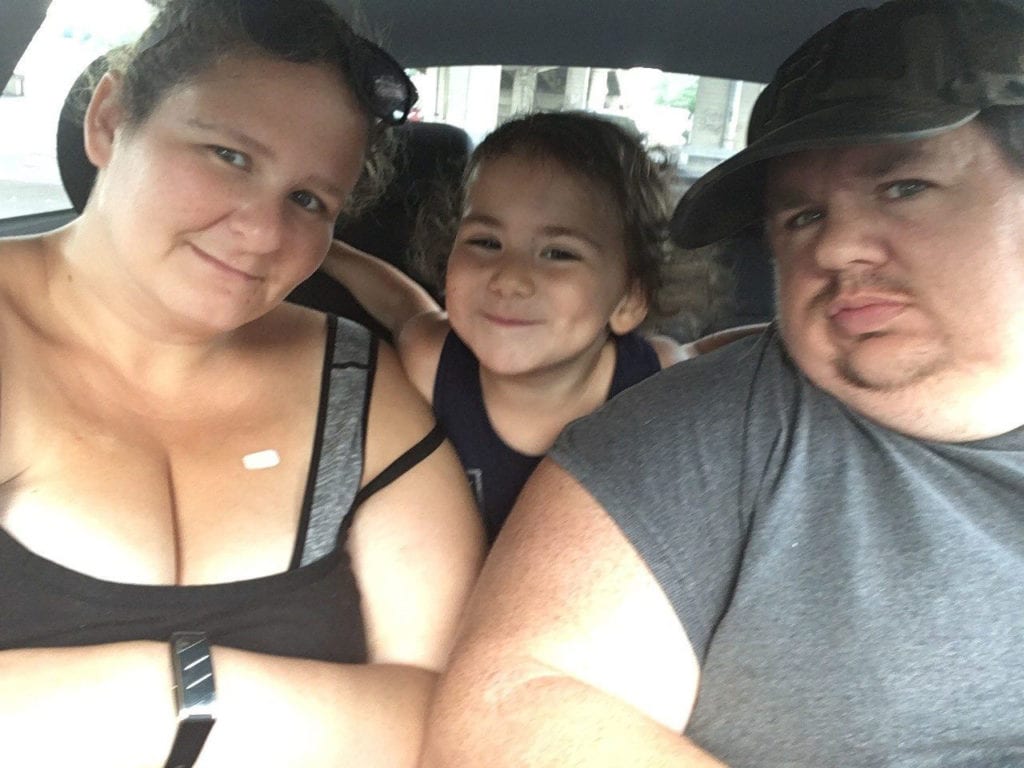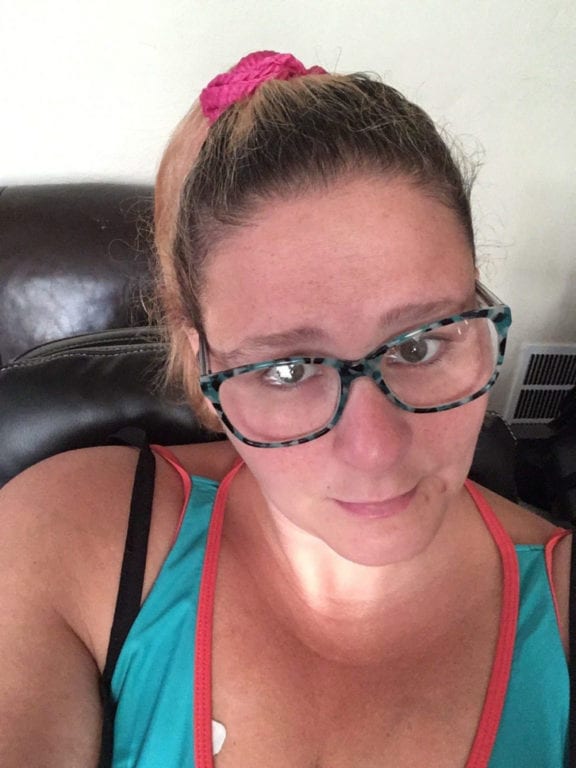The Beginning
My story began in February 2011. On January 10th, 2011, my husband and I were involved in an accident in which we slid off the side of a bridge 10 feet face first, flipping onto the roof once we landed in the icy creek below. I was lucky that I only had a sprained ankle and nose, cuts and bruises, whiplash and a concussion. To this day I still suffer from post-concussive disorder.
I was scheduled to have Roux-en-Y gastric bypass surgery done a few days after my accident. Mind you, I was 400lb and had asthma, depression, and anxiety. I was working 80 hours a week. They postponed the surgery until February 15, 2011, to give me time to heal and be out of the neck collar before the surgery.

The ER
I kept complaining to my PCP that my heart rate was high and I could feel it, like it was beating out of my chest and I was always dizzy. Finally, after about 6 months of being told it was anxiety or “it’s all in your head,” the symptoms started to kick into high gear. I was going to the ER multiple times per week from passing out and high heart rate. One night, while I was in the ER, my heart rate reached 245 beats per minute while lying there. Medical staff all came running in as the alarms were going off. They finally decided I wasn’t crazy and admitted me. They ran a ton of tests which all came back showing that my heart was fine. They set me up with a cardiologist who prescribed a beta blocker. That only helped for a little while. So the MD upped the dose. That too worked for a little while, but then it became too high for my heart. My heart rate was in the 40s– so low that that my symptoms got even worse. I was passing out fifteen to twenty times per day.
The Tilt Table Test
I was put on a holter monitor for 30 days and the doctor was able to see my episodes so he decided to schedule me for an EP study. That study showed nothing. The lead had become stuck on tissue next to my heart, so they had to put me completely under and cut a small hole on right side of my chest to get it unstuck. They had to run tests while I was under to make sure they hadn’t put a hole in my heart. The cardiologist kept me overnight and told me he wanted to do the tilt table test in the morning (this is mid-2012 by now). When I was raised my heart rate jumped 60 bpm almost instantly and my blood pressure was so low they couldn’t hear to get the bottom number. By the time two and a half minutes passed upright my heart rate was in the 190s and I was beginning to faint, so they laid me back down. The doctor looked at me and said, “You have POTS.”
The next day before leaving, he gave me a lot of information on POTS and told me that he believed it was brought on by trauma from having the Roux-en-y gastric bypass surgery and the problems that followed it. He could not be 100% certain since I was in the accident the month prior. He said they both may have been too much and caused it, but he was certain that it was brought on by trauma.
A Rough Year
2012 was a rough year. By the time I had finally received a diagnosis that my symptoms weren’t caused by mental illness,* I had spent 9 months off and on in the hospital getting fluids, surgeries, and procedures. My veins were so run down that my gastric bypass surgeon had a picc line placed, because he noticed admitting me and pumping me with fluid helped me feel better for a few days. I had my first infusion a few hours after having the picc line placed.
By 9pm that night, I was in the ER with awful pain and burning in my arm. I was told I had a DVT (deep vein thrombosis) from the picc line. I was so scared hearing the word DVT; I was afraid I would die before I got to live. It was removed the next day and I was put on blood thinners for 4 months.
I lost my independence, my drivers license, my freedom, and my life as I knew it. I was always passing out a minimum of ten times per day.
Once I got my POTS diagnosis, the cardiologist wanted me to go to Cleveland Clinic to receive treatment for POTS. My secondary insurance would not pay for it because it was out of state (I’m from Pennsylvania). I would be responsible for 20% of the bill and they wanted to re-do every test I had already had done. I had no choice but to search high and low to find a cardiologist in my area that was familiar with and treated POTS. My cardiologist is good, but can only offer me certain medication options because he’s not completely aware of everything available for use. At my last appointment, he told me he treats about a dozen other patients with POTS, and they are trying to push for the hospital to hire some who specializes in all options for POTS to at least to work closely with other cardiologists treating these patients, so that we’re not so limited in our options.
A New Life
In 2013 I became pregnant with my daughter. Amazingly, I stopped passing out the month before I found out I was pregnant. I realized I would have to come off of my meds. After the gastric bypass surgery, my list of medical conditions went from 3 to well over 20. I had hyperemesis my entire pregnancy. My heart rate was high, especially my first trimester, and not being able to hold fluids down didn’t help much. By my third trimester, I felt the best I had since I started to get POTS symptoms. Pregnancy actually made things better. Unfortunately, months post pregnancy, my symptoms came back to the point I needed to go back on medication to manage it.
While all of this crazy medical drama was happening, my aunt, my best friend, was fighting stage 4 ovarian cancer. I was seeing how she fought every day and was not willing to give up! She wanted to live her life. By the time I had my daughter, her fight was beaten into my head. I knew I needed to and was determined to fight POTS like she fought cancer, even though they different conditions. I had to be strong for my daughter, to give her the life she deserves. Sadly, my aunt passed away 3 years ago, but only after battling stage 4 cancer for 9 years. To this day, every time I think I can’t do something or think I’m not strong enough, I remember her fight and her life.

These days my symptoms are a pain, but I try to live every day to the fullest. I want to give my daughter the life I want her to have and that she deserves. The problem that I am facing now is that I learned to put the “everything is fine face on “ and push myself until I pay for it at night while I cry myself to sleep in pain. Now, when I ask for help or say I can’t do something, I feel like I get ignored or told “oh you’re doing a good job, take your time, take breaks, you can do it.” It hurts me deeply that when I lost my independence before, I learned how to get it back– and everyone was there and wanted to help. Now I feel like they forget how POTS makes me feel.
These are my main symptoms I deal with. Some days I deal with all of them, others, only a few. Waking up everyday not knowing what’s going to effect you that day takes a toll on you because you have to be prepared:
- low blood pressure
- high heart rate
- insomnia
- brain fog
- vision disturbance
- fatigue
- edema
- exercise intolerance
- heat and cold intolerance
- nausea
- dizziness
- light-headedness
- migraine
- poor concentration
- neck and chest discomfort
- wide spread chronic pain
- rashes that appear from nowhere
Finding Support
POTS support groups online have helped me tremendously. Having other people who understand what you are going through because they are going through it themselves makes an enormous difference. It has helped a lot to have people who understand and offer their opinion or words of advice and suggestions. Also it makes me feel good that sharing my experiences, tips, suggestions, etc. may help another person out. It’s truly rewarding.
We don’t take many family pictures. I see Dr. Wong at UPMC Magee Women’s Hospital Heart And Vascular Institute. I’m happy with my care, but have come to a brick in the road where he doesn’t have many options left to try to help me. My insurance will not cover an out-of-state doctor.
*In October 2011 through the end of 2012, I was hospitalized in a mental health facility fourteen times. I wanted so badly to die; I didn’t want to deal with POTS anymore. One psych doctor kept me for almost 2 months. I’d say by January 2012, he had told me I had dysautonomia. He was determined to help me get answers since I had not yet been tested for POTS. He was ordering tests and scans everyday to see if he could come up with something. I hated him at first for it, but as I look back he truly cared for me as a patient and had seen the heartache, stress, and depression that all these unanswered questions were causing me. Although it was not a POTS diagnosis, it was a step in the right direction.
What are your thoughts on Joanna’s story? Share your stories, thoughts, and hopes with the Patient Worthy community!
Check out our partners, the Dysautonomia Advocacy Foundation!


